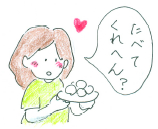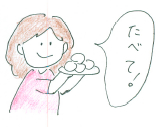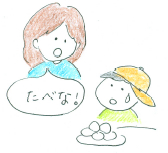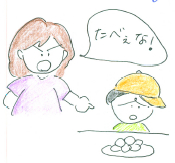1. Kansai Imperatives “Do…!”
When you want somebody to do something, you can use either the request
form or imperatives, depending on the addressee and the situation. It’s
the same in Kansai-ben, however, there are Kansai-specific imperatives
indicated in the chart below.
(As for casual request form using てform, refer to
Grammar 4
in Ch3
Lesson 2)
|
Standard
|
(example)
|
Kansai
|
(example)
|
(sound)
|
Request (favor)
|
〜てくれない? |
書いてくれない?
|
〜てくれへん?
〜てんか。
|
書いてくれへん?
書いてんか。
|
|
| Request |
〜て(ね/よ) |
書いて。
書いてね。
書いてよ。
|
〜て。
〜てな/や。 |
書いて。
書いてな。
書いてや。 |
|
| Request (stronger) |
-
|
-
|
〜てぇな/や。
|
書いてぇな。
書いてぇや。
|
|
| Command (parents to children) |
Masu-stem+なさい |
書きなさい。
|
-
|
-
|
|
Command
“Unless you do…/You must…” |
V(negative stem) + なくちゃ/なきゃ。
|
書かなくちゃ。
書かなきゃ。
|
V(negative stem) んと/な
(refer to G2 in Ch4 Lesson 2)
|
書かんと。
書かな。
|
|
| Kansai Imperatives (gentle) |
-
|
-
|
Masu-stem (+ な/や/よし: Kyoto,
feminine)
|
書き。
書きな。
書きや。
(書きよし。)
|
|
Kansai Imperatives (stronger)
|
-
|
-
|
Masu-stem (longer-vowel)
+な/や
|
書きぃな。
書きぃや。 |
|
| Imperatives |
Ru: Stem+ろ
U: Stem-U, +E
Irr:しろ, こい |
食べろ。
書け。
勉強しろ。
行って来い。
|
|
|
|
The formation of the Kansai imperatives is as follows;
|
|
(example)
|
(sound)
|
Ru-Verb
|
Masu-stem
(*one mora stem tends to be lengthened)
|
食べ、起き、見ぃ、寝ぇ、やってみぃ
|
|
| U-Verb |
Masu-stem |
飲み、行き、帰り、書き、やめとき、やってしまい |
|
| する |
しぃ/せぇ(blunt) |
勉強しぃ、相談せぇ |
|
| 来る |
きぃ |
買うてきぃ、もろてきぃ |
|
The Kansai Imperatives can be used more widely compared to the regular
imperatives. It can be an equivalent of 〜なさい, but can be used for
anybody who is close to the speaker unlike the standard in which
〜なさい is usually used by parents (especially mothers) for their
children. The Kansai imperatives can even indicate a gentle suggestion.
(Mother to her child) ちょっと、いつまでもテレビ見てんと、はよ
消して寝ぇ。
(ST ちょっと、いつまでもテレビを見ていないで、早く消して寝なさい。)
(To one’s father)
そんなドラえもんのネクタイなんか
恥ずかしし、やめとき。
(ST そんなドラえもんのネクタイなんか恥かしいから、やめといたら?)
*ドラえもん Doraemon ( a famous Japanese comic character )
(To one’s friend) あの
新しポカリのコマーシャル見てみぃ。おもろいで。
(ST あの新しいポカリのコマーシャル見てみたら?おもしろいよ。)
* ポカリ=ポカリスエット Pocari Sweat (a popular Japanese sport drink)
(To one’s friend)
危な〜!もうちょっとで
電柱ぶつかるとこやったやんか!ちゃんと
前見て
運転しぃ!
(ST 危ない!もうちょっとで電柱にぶつかるところだったじゃん!ちゃんと前見て運転しなさい/しろ!)
* 電柱: utility pole, telephone pole
The Kansai imperatives are often used with assertive particles な/や, and
they can be stronger if the mora preceding the particles is accentuated.
はよ
寝ぇや/はよ
寝ぇな < はよ
寝ぇや/はよ
寝ぇな
食べ
や/食べ
な < 食
べぇ
や/食
べぇな
手伝いや/
手伝いな <
手伝いぃや/
手伝いぃな
Extra 1: はよ食べよし
You might hear women of the older generation in Kyoto add よし instead of
な/や. よし is a traditional feminine assertive particle in Kyoto used with
imperative expressions, and it functions the same as な/や. The accent
always comes preceding よし whether it is meant as a gentle suggestion or
a command.
(Kyoto, female, to a friend) ちょこっとだけ
休んで
行きよし。
(ST ちょっとだけ休んで行ったら?)
(Kyoto, female, to her child)
何ゆっくりしてんの!はよ行きよし!
(ST 何ゆっくりしてるの!早く行きなさい!)
Extra 2: Standard imperatives in Kansai
Kansai people do use standard despite the fact that they have their own
(maybe due to the recent invasion of standard Japanese into this
dialect.) Standard imperatives are really strong, blunt commands,
usually (but not limited to be) used by male speakers. The Kansai
assertive particle や (not な) may be added to the end.
(Male to a friend) 何してんねん!はよ来い!
(ST 何してんのさ!早く来い!)
(Father to his child)
寝るまでにちゃんと
宿題やっとけや。
(ST 寝るまでにちゃんと宿題やっておけよ。)
(Kansai yakuza)
金出せちゅうてんのが
分からんのか!
(ST 金を出せって言ってるのが分からないのか?)






